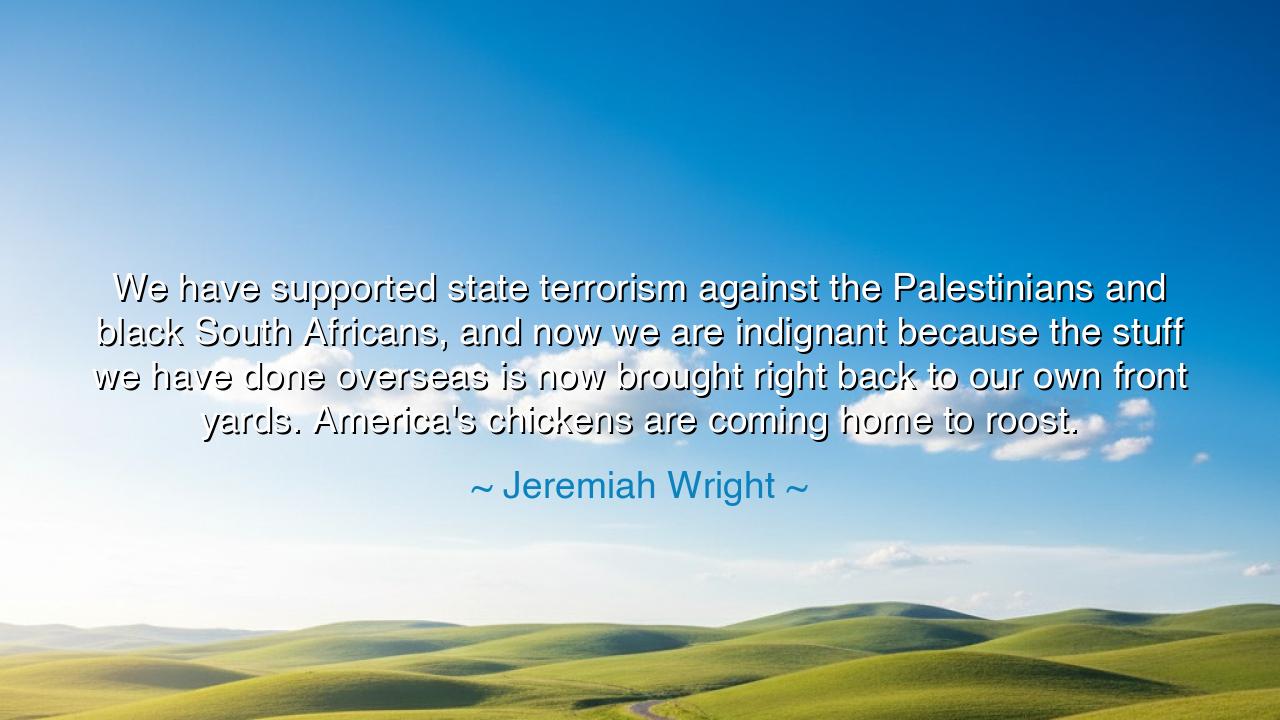
We have supported state terrorism against the Palestinians and
We have supported state terrorism against the Palestinians and black South Africans, and now we are indignant because the stuff we have done overseas is now brought right back to our own front yards. America's chickens are coming home to roost.






In the thunderous and unflinching words of Jeremiah Wright, the American pastor whose sermons ignited both controversy and reflection, we hear not only outrage but prophecy: “We have supported state terrorism against the Palestinians and black South Africans, and now we are indignant because the stuff we have done overseas is now brought right back to our own front yards. America’s chickens are coming home to roost.” This declaration, though fierce, is not born of hatred — it is born of history. It is the cry of conscience echoing through time, a reminder that no nation, however mighty, can sow injustice abroad and reap peace at home. His words resound like those of the ancient prophets who stood before kings, daring to tell the truth: that the law of cause and effect binds not only men, but empires.
To say that “the chickens are coming home to roost” is to invoke a truth as old as the earth itself — that every act returns to its source. The ancients called it karma, the law of moral balance. The Greeks named it Nemesis, the goddess who punishes hubris and restores harmony to the world. Wright’s warning is an American iteration of this eternal law: that the violence a nation unleashes beyond its borders will one day find its way back across them. Just as an arrow shot into the sky eventually falls back to the ground, so too do the consequences of greed, domination, and hypocrisy return to those who first loosed them. His sermon, fiery and uncomfortable, sought not to condemn his homeland, but to awaken it from moral sleep.
The origin of Wright’s statement lies in the long and painful history of American involvement in global and racial struggles. He speaks of the Palestinians, whose generations have lived under occupation and displacement, and of black South Africans, who endured decades of apartheid — systems of oppression that America, at various times, either supported or silently tolerated for political gain. He points to a pattern: that nations often act abroad in ways they would never permit at home, cloaking self-interest in the language of freedom. Yet when those same forces of hatred and vengeance, which have been nurtured overseas, begin to manifest within their own cities — through violence, division, and fear — they recoil in shock, unwilling to see their own reflection.
History offers countless examples of this truth. Consider Rome, the eternal empire that conquered the world with sword and pride. For centuries it waged wars of domination, enslaved foreign peoples, and celebrated its own might. Yet when the barbarian invasions came — when fire and sword entered Rome’s gates — it was not merely a military defeat but a moral reckoning. The empire fell beneath the weight of its own arrogance. So too does Wright’s warning remind America that no nation is invincible when it loses its soul. The collapse of justice within, or cruelty without, is not a distant thunder — it is the whisper of an approaching storm.
Yet Wright’s tone is not that of despair, but of accountability. He calls upon his country not to perish in guilt, but to repent and reform — to look honestly at its actions, both past and present, and to realign them with the ideals it professes. The prophets of Israel once did the same, standing before kings to cry out: “You have forsaken justice; you have oppressed the stranger, the widow, and the orphan!” Their goal was not destruction, but redemption. So too does Wright, in his searing words, call for renewal — that America might turn its strength toward compassion rather than conquest, its wealth toward healing rather than harm.
His phrase, “the chickens are coming home to roost,” is as much a mirror as a warning. It forces the listener to see that violence breeds violence, and that the walls we build to contain others will one day enclose us. Yet it also invites hope: for if the seeds of injustice can bear bitter fruit, then the seeds of mercy can bear sweet ones. The same law that punishes wrongdoing can reward virtue. As the wise have always taught — as sowing, so reaping. If America, or any people, chooses to plant truth, humility, and justice, then even after centuries of suffering, the harvest can still be peace.
Let this be the lesson: no power, no nation, no person escapes the consequences of their deeds. To act with cruelty is to invite suffering; to act with integrity is to invite harmony. The wise must therefore live — and govern — with foresight, remembering that every choice is a seed cast into the soil of time. A people that forgets this law will one day awaken to the sound of its own “chickens” returning — the echoes of its past mistakes made flesh.
Action to take: reflect upon your own influence — the small empire of your actions, words, and choices. What are you sowing in the lives of others? Are you building peace or resentment, unity or division? As Jeremiah Wright teaches, every act circles back. To heal the world, one must begin with honesty. To save a nation, one must start with truth. And to find peace, one must first plant justice — for only then will the harvest of righteousness come home, not as retribution, but as blessing.






AAdministratorAdministrator
Welcome, honored guests. Please leave a comment, we will respond soon